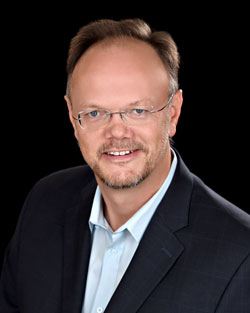Research Awards
Dr. Marc Rodger
Clinical Epidemiology Program
Winner of the Chrétien Researcher of the Year Award 2014

If it's the TIPPS trial (Thrombophilia in Pregnancy Prophylaxis Study) and you are Dr. Marc Rodger, senior scientist in the Clinical Epidemiology Program at the Ottawa Hospital Research Institute, you persevere.
And then you persevere some more, maintaining vision and drive through 12 years of trial recruitment.
Dr. Rodger had set out to determine whether daily injections of anticoagulants to the belly would improve outcomes for pregnant women with a high risk of placental-mediated complications. Enrolment was extremely challenging. First, patients were reluctant to enrol.
"Women who've had pregnancy complications are willing to do almost anything that might benefit the baby. In our randomized trial, we essentially were flipping a coin for them, taking control away from the pregnant mother," says Dr. Rodger, who is also Chief and Chair of Hematology and Head of The Ottawa Hospital's Thrombosis Program.
Second, the therapy he was testing had become common practice, making enrolment doubly difficult because many women were already receiving the treatment and didn't want the trial. With as many as one in 10 women suffering from a tendency to develop blood clots (thrombophilia) during pregnancy, anticoagulant (LMWH) injections were routinely administered to pregnant women around the globe, despite never having been examined in a proper trial.
"I just wanted this question answered because it's important to these women. In the clinic it's heart-wrenching to say to them, 'I don't know,'" says Dr. Rodger of the routine questions expectant mothers ask about the efficacy of anticoagulants to prevent pregnancy complications.
"My motivation comes from caring for patients and hearing their poignant stories. Without good evidence, I didn't want to waste their time with needles, which are painful and expensive, often at a cost of up to $15,000 for a pregnancy."
Dr. Rodger dealt with trial hurdles as they came. By the time the final granting opportunity came along— years into the project — it landed like an all-or-nothing prospect to finish, and Dr. Rodger was heartened. He asked for $2.4 million to expand the trial in the United States and to Europe and Australia because recruitment was saturated at existing North American sites for the trial.
This expansion brought added value, because well-designed trials should be multi-centre and multi-country to ensure that a range of socio-economic, cultural and ethnic backgrounds are represented.
His results, published July 2014 in The Lancet, are startling and practice-defining. In the vast majority of cases, injections given to pregnant women with blood clotting tendencies were totally unnecessary.
An editorial in The Lancet states that "TIPPS investigators should be congratulated for completing this much needed, rigorous trial... Hopefully, these results will finally 'tip' clinicians away from using LMWH in this setting and 'tip' researchers towards pursuing other potentially effective preventative interventions."
"I wanted to find the magic bullet," says Dr. Rodger. who started TIPPS hoping that LMWH would be that magic bullet.
"During the time we gave these women these needles ineffectually, we were basically telling them we've solved the problem. As well, we were not conducting studies to look for the next magic bullet. We were putting back research for years by not looking for it," he says.
Although clearly an advocate for research now, it wasn't on Dr. Rodger's radar when he became a physician. Today, he is thankful for his first research opportunity.
"I always wanted to be a physician and help patients. But seven years into my medical training, I was forced to do a research project as part of my training. That got me really jazzed about answering clinical questions.
"It grew from wanting to answer clinical questions to wanting to change practice — leaving a legacy of not just helping the patient in front of me, but patients from around the world and for generations," says Dr. Rodger.
And with TIPPS, it's clear he has.
